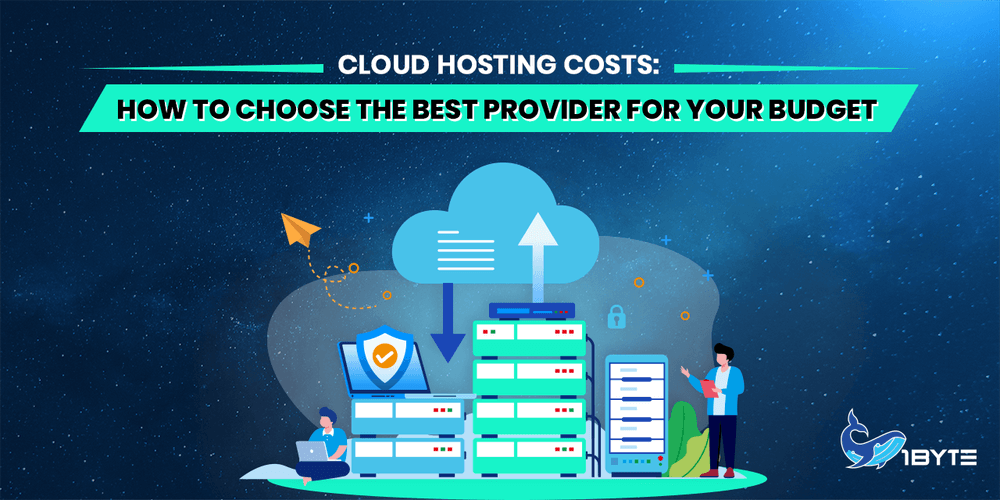Cloud hosting has emerged as a popular choice for businesses looking for flexible and cost-effective hosting solutions. With the ever-increasing demand for cloud-based services, companies are adopting cloud hosting to improve their operational efficiency, scalability, and reliability. However, choosing the right cloud hosting provider can be a challenging task, especially when it comes to estimating and managing cloud hosting costs.
In this comprehensive guide, we’ll take a deep dive into cloud hosting costs, covering everything from understanding different cost models and factors to minimizing and calculating costs accurately. Whether you’re a small business or a large enterprise, our expert tips and insights will help you make informed decisions while keeping your budget in check.
On Cloud Hosting
Cloud hosting has become increasingly popular in recent years due to its numerous benefits such as improved scalability, reliability, and cost-efficiency. In this section, we will explore the fundamentals of cloud hosting, its types, and its advantages over traditional hosting options. We will also delve into the different cost models used by cloud hosting providers and the factors that affect cloud hosting costs.
By understanding the basics of cloud hosting, you will be better equipped to make informed decisions when it comes to selecting the right cloud hosting provider and minimizing your cloud hosting costs.
FURTHER READING: |
| 1. Top 5 Best Cloud Hosting Providers for Your Business |
| 2. How to Estimate Cloud Hosting Costs: 5 Tips and Tricks |
| 3. Top 15 Best Domain Registrars for Small Businesses |
What is Cloud Hosting?
Cloud hosting is a type of hosting service that operates on a network of interconnected servers instead of a single server. This allows for improved scalability, reliability, and flexibility compared to traditional hosting options.
Cloud hosting operates on a pay-as-you-go model, where you only pay for the resources you use. This means that you can easily scale up or down depending on your needs without having to worry about server limitations.
In traditional hosting, if your website experiences a sudden surge in traffic, it can result in downtime or slow loading times. However, with cloud hosting, your website can handle sudden spikes in traffic without any disruption in service.

Cloud hosting also offers better security features than traditional hosting, with most cloud hosting providers offering advanced security measures such as data encryption, firewalls, and regular data backups.
There are different types of cloud hosting services, including public, private, and hybrid cloud hosting. Public cloud hosting is the most commonly used option and is offered by companies like Amazon Web Services, Microsoft Azure, and Google Cloud Platform. Private cloud hosting, on the other hand, is used exclusively by a single organization and can be located on-premises or off-premises. Hybrid cloud hosting combines elements of both public and private cloud hosting.
The Significance of Choosing The Right Cloud Hosting Provider
Choosing the right cloud hosting provider is essential for businesses looking to get the most out of their cloud hosting investment. The right provider will not only offer you the resources you need but also provide high-quality services and support to ensure that your website or application runs smoothly.
If you choose a provider that doesn’t offer reliable services, your website or application may experience frequent downtime or slow loading times, which can have a negative impact on your business. According to Google, 53% of mobile visitors will abandon a website if it takes more than 3 seconds to load.
Additionally, if your provider doesn’t offer good security measures, your data may be at risk of being stolen or lost. This can be particularly damaging if you handle sensitive customer information such as credit card numbers or personal data.
Choosing the right cloud hosting provider can also affect your overall costs. Different providers offer different pricing models and packages, which can affect your overall spending. Some providers offer pay-as-you-go models, while others offer fixed monthly or yearly plans. It’s important to choose a provider that offers a pricing model that aligns with your business needs and budget.
In conclusion, choosing the right cloud hosting provider is crucial to the success of your business. Not only can it impact the performance and security of your website or application, but it can also affect your overall costs. In the next section, we will explore the different cost models used by cloud hosting providers and the factors that can affect cloud hosting costs.
Understanding Cloud Hosting Costs
Understanding the cost of cloud hosting is essential for businesses that want to make the most out of their investment in the cloud. While cloud hosting can offer many benefits, it’s important to understand the different cost models used by providers and the factors that can affect cloud hosting costs. In the next section, we will explore the statistics on the costs of cloud hosting today. After that, we will go over different cost models used by cloud hosting providers and the factors that can affect cloud hosting costs.

Statistics on Cloud Hosting Costs
Cloud hosting is a way of storing and accessing data over the internet, instead of on a local computer or server. It can offer many benefits, such as scalability, reliability, security and cost-efficiency. However, it also has some challenges, such as complexity, compatibility and regulation, which affects its costs. Here are some of the latest statistics on cloud hosting costs that you should know:
- The global cloud computing market is expected to reach $832 billion by 2025, growing at a compound annual growth rate (CAGR) of 17.5%.
- The leading cloud service provider is Amazon Web Services (AWS), which holds 32% of the market share, followed by Microsoft Azure with 19% and Google Cloud Platform with 7%1. These three providers account for more than half of the total cloud revenue.
- The average cost of cloud hosting for small businesses ranges from $20 to $100 per month, depending on the features and resources needed. However, this cost can vary widely depending on the type of cloud service (IaaS, PaaS or SaaS), the pricing model (pay-as-you-go or subscription) and the provider chosen.
- One of the main challenges of cloud hosting is optimizing the cost and performance of the cloud resources. According to a report by CloudZero, cloud spend wastage is estimated to reach $21 billion in 2021, due to overprovisioning, unused resources and inefficient management. This means that many businesses are paying more than they need for their cloud services.
- To reduce cloud spend wastage, businesses need to adopt best practices such as monitoring usage patterns, setting budgets and alerts, automating scaling and provisioning processes and using tools such as AWS Cost Explorer or Azure Cost Management.
- Another trend in cloud hosting is the increasing adoption of hybrid and multi-cloud strategies. Hybrid cloud refers to using both public and private clouds for different purposes within a single organization. Multi-cloud refers to using multiple public clouds from different providers for different applications or workloads. According to Statista, 58% of enterprises plan to use hybrid clouds by 2020, while 81% plan to use multi-clouds by 2024.
- The main drivers for hybrid and multi-cloud adoption are improved performance, flexibility, security and cost-efficiency. However, these strategies also pose some challenges such as increased complexity, interoperability issues and governance risks.
Types of Cloud Hosting Services
Cloud hosting providers offer different types of cloud hosting services with varying cost models. Here are the most common types of cloud hosting services and their cost models:
- Public Cloud Hosting: Public cloud hosting is a service where multiple clients share resources on a cloud infrastructure provided by a third-party service provider. This type of cloud hosting offers a pay-as-you-go pricing model, where you only pay for the resources you use. This can be a cost-effective option for businesses with fluctuating resource needs.
- Private Cloud Hosting: Private cloud hosting is a service where a dedicated cloud infrastructure is provided to a single organization. This type of cloud hosting offers a fixed pricing model based on the resources provided, making it easier to budget for cloud hosting costs.
- Hybrid Cloud Hosting: Hybrid cloud hosting is a service that combines elements of public and private cloud hosting. This type of cloud hosting allows businesses to take advantage of the benefits of both types of cloud hosting, such as scalability and cost-effectiveness. The cost of hybrid cloud hosting can vary depending on the specific needs of the organization.
- Managed Cloud Hosting: Managed cloud hosting is a service where a third-party service provider manages and maintains your cloud infrastructure for you. This type of cloud hosting offers a fixed pricing model based on the services provided, making it easier to budget for cloud hosting costs.
It’s important to note that the cost of cloud hosting can vary depending on several factors, such as the size and complexity of your website or application, the amount of traffic you receive, and the resources you require. Additionally, different cloud hosting providers may offer different pricing models and packages, making it important to research and compare providers to find the best fit for your business needs and budget.
Factors that Affect Cloud Hosting Costs
There are several factors that can affect cloud hosting costs, including:
- Resource usage: The amount of resources, such as CPU, RAM, and storage, that your website or application requires will directly impact the cost of cloud hosting. The more resources you require, the higher the cost will be.
- Traffic volume: The amount of traffic your website or application receives can also impact cloud hosting costs. If you have high traffic volumes, you may need to use more resources to handle the traffic, which can increase your hosting costs.
- Location: The location of your cloud hosting provider can also impact costs. Providers in different regions may offer different pricing models or have varying infrastructure costs, which can affect the overall cost of hosting.
- Scalability: The ability to scale resources up or down based on demand can impact hosting costs. Some providers offer automatic scaling options, which can help optimize costs by only using resources as needed.
- Level of management: The level of management required for your cloud hosting can also affect costs. For example, managed hosting, where the provider takes care of all maintenance and updates, will typically cost more than unmanaged hosting, where you are responsible for managing your own infrastructure.
- Type of cloud hosting service: As discussed earlier, the type of cloud hosting service you choose can also impact costs. Public cloud hosting, for example, offers a pay-as-you-go pricing model, while private cloud hosting offers a fixed pricing model.
- Additional services: Some cloud hosting providers may offer additional services, such as backups or security, which can impact costs. It’s important to consider whether these services are necessary and if they are included in the pricing or billed separately.
By understanding these factors and how they impact cloud hosting costs, you can make more informed decisions about your cloud hosting investment and optimize your costs.
Common Pricing Structures
Cloud hosting providers use different pricing models, depending on their offerings and target customers. Here are some common pricing structures used by cloud hosting providers:
- Pay-As-You-Go (PAYG) pricing: This model allows customers to pay only for the resources they use. The pricing is usually based on the number of hours or minutes that the resources are used, such as CPU cycles, storage, and data transfer.
- Reserved Instances (RI): Reserved instances are ideal for users who know how much capacity they need for a specific period. RI pricing is based on a fixed term commitment of resources for a discounted price. Customers can choose to pay upfront, partially upfront or no upfront cost.
- Spot instances: Spot instances are ideal for workloads that are flexible in terms of start and end times. Spot instances pricing is based on supply and demand principles, making it much cheaper than PAYG and RI options, but not suitable for applications with strict uptime requirements.
- Monthly/Annual pricing: Some cloud hosting providers offer monthly or annual pricing, which is ideal for customers with stable workloads.
- Tiered pricing: This pricing model offers customers different price points based on usage volume. As usage volume goes up, the price per unit goes down.
It is crucial to choose a pricing structure that suits your business needs and budget. Comparing the pricing models offered by different cloud hosting providers and their features and benefits can help you make an informed decision.
Choosing the Right Cloud Hosting Provider
Now that we’ve covered the basics of cloud hosting costs and pricing structures, it’s important to discuss how to choose the right cloud hosting provider. With so many options available, it can be overwhelming to determine which provider is best for your needs. In this section, we’ll explore some key factors to consider when evaluating cloud hosting providers and how they can impact the overall cost of your cloud hosting solution. By the end of this section, you should have a better understanding of what to look for in a cloud hosting provider to ensure you get the most value for your investment.

Factors to Consider
When selecting a cloud hosting provider, there are several factors that you should consider to ensure that you are getting the best value for your money. Here are some important factors to keep in mind:
- Reliability and uptime: Choose a provider with a track record of delivering consistent uptime and reliable service. Downtime can result in lost revenue and productivity, so it’s essential to choose a provider that you can rely on.
- Scalability: Your business needs may change over time, so it’s important to choose a provider that can accommodate your growth. Look for providers that offer flexible plans, with the ability to easily upgrade or downgrade as needed.
- Security: Data security is critical for any business, especially when it comes to cloud hosting. Choose a provider that offers robust security features such as firewalls, encryption, and regular backups.
- Support: Look for a provider that offers responsive and knowledgeable support. When issues arise, you want to be able to quickly and easily get the help you need.
- Cost: Of course, the cost is an important factor when selecting a cloud hosting provider. Consider the total cost of ownership, including any setup fees, monthly fees, and additional costs such as bandwidth or storage overages.
- Reputation: Do your research and read reviews from other businesses that have used the provider you are considering. Look for a provider with a solid reputation for quality and customer satisfaction.
By taking the time to consider these factors, you can choose a cloud hosting provider that meets your needs and budget while providing reliable, secure, and scalable service.
Comparison of Popular Cloud Hosting Providers Based on Their Costs and Features
When choosing a cloud hosting provider, it’s important to compare the costs and features of various providers to ensure that you’re getting the best value for your money. Here are some of the most popular cloud hosting providers and a comparison of their costs and features:
1. Amazon Web Services (AWS)
AWS is one of the most popular cloud hosting providers, offering a wide range of services and features. They offer a pay-as-you-go pricing model, which means that you only pay for the resources you use. AWS also offers a free tier for new customers, allowing you to test out their services without incurring any costs.
2. Microsoft Azure
Azure is Microsoft’s cloud hosting platform, offering a range of services for hosting and managing applications. They offer a pay-as-you-go pricing model, as well as reserved instances for customers who need more predictable costs. Azure also offers a free tier for new customers, similar to AWS.
3. Google Cloud Platform (GCP)
GCP is Google’s cloud hosting platform, offering a range of services for hosting and managing applications. They offer a pay-as-you-go pricing model, with discounts for sustained usage. GCP also offers a free tier for new customers, similar to AWS and Azure.
4. DigitalOcean
DigitalOcean is a simpler and more affordable cloud hosting provider, offering a range of services for developers and small businesses. They offer a flat pricing model based on the resources you need, with no hidden fees or complicated billing. DigitalOcean also offers a free trial for new customers, allowing you to test out their services before committing to a paid plan.
5. Linode
Linode is another affordable cloud hosting provider, offering a range of services for developers and small businesses. They offer a simple pricing model based on the resources you need, with no hidden fees or complicated billing. Linode also offers a free trial for new customers, similar to DigitalOcean.
When comparing cloud hosting providers, it’s important to consider factors such as pricing, features, reliability, and customer support. It’s also important to read reviews and testimonials from other customers to get an idea of their experiences with each provider. By doing your research and comparing your options, you can find the cloud hosting provider that best meets your needs and budget.
Conclusion
In conclusion, cloud hosting costs can vary depending on various factors such as the type of service, pricing structure, and the provider you choose. At 1Byte, we understand the importance of finding a cloud hosting provider that not only fits your budget but also provides reliable and efficient services. Our flexible pricing plans allow you to scale up or down as your business grows while ensuring you only pay for what you need. We also offer top-notch features, including high-speed network connectivity, automatic backups, and 24/7 customer support. With our competitive pricing and exceptional services, you can trust 1Byte to be your partner in the cloud.

